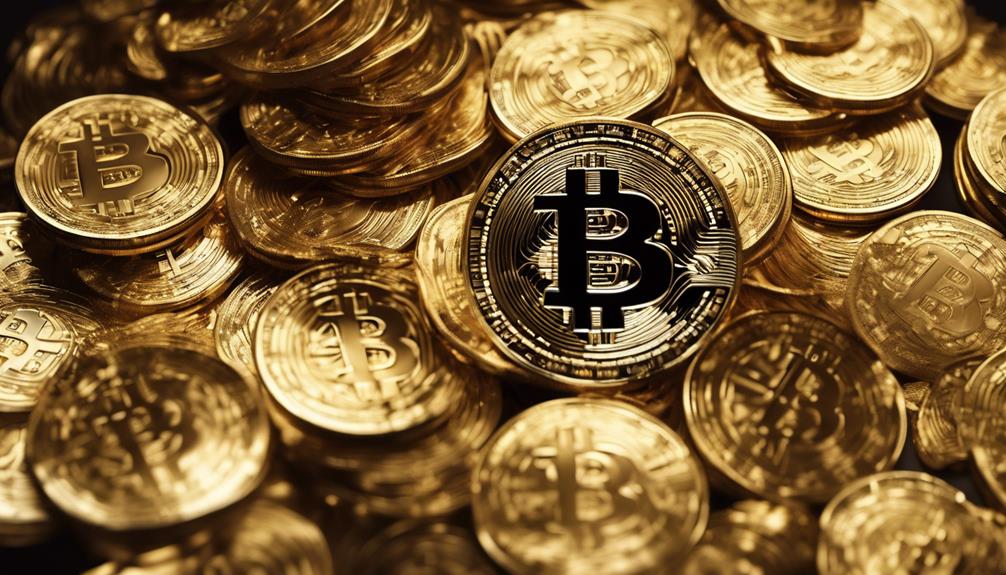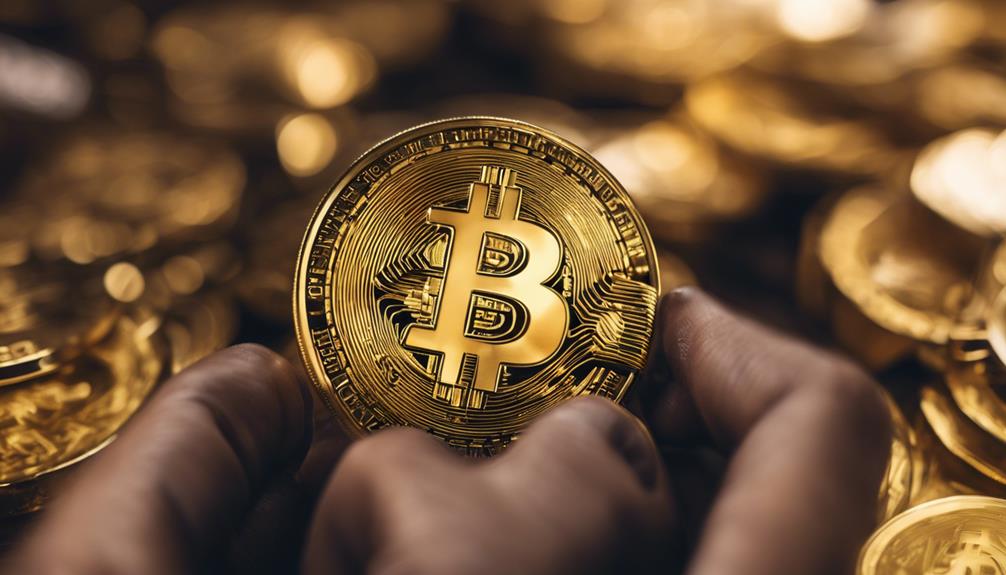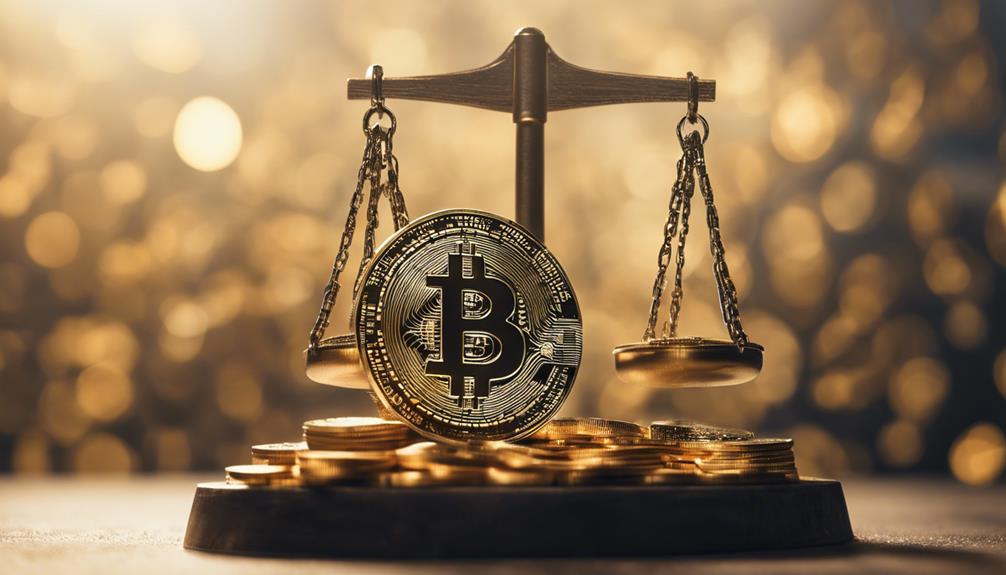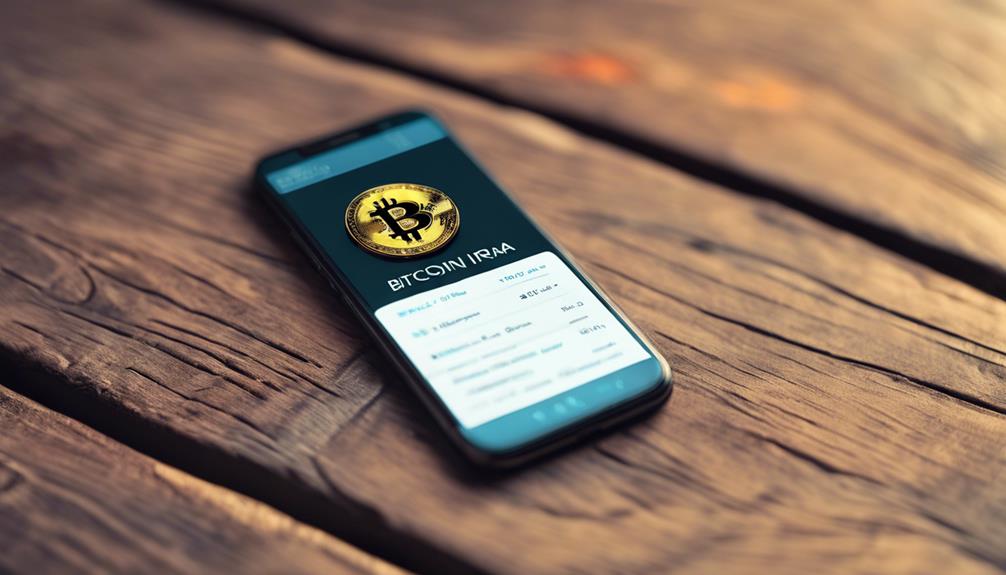In contrast to gold, Bitcoin is distinguished by its limited supply, deflationary characteristics, and decentralized structure that safeguards against manipulation. Its increasing scarcity and digital immutability position it as a valuable asset. Bitcoin facilitates rapid global transactions and microtransactions through its divisibility, unlike gold which is constrained by physical limitations. The transparency ensured by blockchain technology ensures secure and transparent financial transactions. With robust security measures and inclusivity for all backgrounds, Bitcoin is revolutionizing financial inclusion. Its transformative potential challenges traditional investment options, providing an alternative approach in today’s dynamic financial landscape. Discover more about Bitcoin’s advantages over gold by exploring its unique features and functionalities.
Key Takeaways
- Bitcoin's capped supply and deflationary nature increase its scarcity and value proposition over time.
- Bitcoin enables instant, global, and seamless transactions, surpassing gold's physical constraints.
- Bitcoin's high divisibility factor into satoshis allows for microtransactions, unlike gold's limited divisibility.
- Blockchain technology ensures transparency and security in Bitcoin transactions without the need for central authorities.
- Bitcoin's inclusivity, accessibility, and transformative potential challenge gold's dominance and offer a digital alternative in the evolving financial landscape.
Scarcity and Value Proposition

Scarcity and value proposition play pivotal roles in distinguishing Bitcoin as a superior asset to gold. While gold has historically been valued for its scarcity and limited supply, Bitcoin takes this concept to another level. With a capped supply of 21 million coins, Bitcoin is inherently deflationary, increasing its scarcity over time. The decentralized nature of Bitcoin guarantees that its supply can't be manipulated, solidifying its status as a digital asset with enduring value.
Unlike gold, which faces pressures from geopolitical factors and economic conditions that can impact its value proposition, Bitcoin remains insulated from such influences. Its digital nature allows for seamless global transactions, further enhancing its value proposition in today's interconnected world. As economic landscapes shift and evolve, Bitcoin's decentralized and limited supply characteristics position it as a more resilient and reliable store of value compared to traditional assets like gold.
Global Transactions and Divisibility

Bitcoin's instant cross-border transactions make global exchanges efficient, a feat hindered by gold's physical constraints.
The divisibility of Bitcoin into satoshis allows for seamless microtransactions, unlike the cumbersome nature of dividing gold.
With its digital framework, Bitcoin guarantees secure and transparent global transactions, presenting a superior alternative to the logistical challenges of handling physical gold.
Instant Global Transactions
Utilizing Bitcoin for transactions allows for instantaneous global transfers, eliminating the need for intermediaries or delays. This digital currency operates on a decentralized network, enabling seamless cross-border transactions at any time, day or night.
The value of Bitcoin as a global asset lies in its ability to facilitate secure and efficient transactions without the limitations of traditional banking systems. Its blockchain technology guarantees transparency and security, making each transaction tamper-resistant and fraud-proof.
Additionally, the divisibility of Bitcoin into smaller units called satoshis enhances its usability for various purposes, including microtransactions and investing. With Bitcoin, individuals can engage in borderless and censorship-resistant transactions, revolutionizing the way we perceive and conduct global financial exchanges.
High Divisibility Factor
When considering the efficiency of global transactions and the divisibility of assets, Bitcoin's high divisibility factor sets it apart as a superior medium of exchange. Bitcoin's ability to be divided into 100 million satoshis enables seamless microtransactions and cost-effective cross-border payments. This feature makes Bitcoin highly suitable for the digital economy, where small transfers are common. In contrast, traditional assets like gold lack this level of divisibility, limiting their use in modern transactions. The table below highlights the significant difference in divisibility between Bitcoin and gold:
| Aspects | Bitcoin | Gold |
|---|---|---|
| Divisibility | Divisible into 100 million satoshis | Limited divisibility |
| Usage | Ideal for microtransactions | Impractical for small payments |
| Global Reach | Efficient for cross-border payments | Challenges in international transfers |
Transparency Through Blockchain Technology

By harnessing blockchain technology, transparency in financial transactions has been elevated to new heights. Bitcoin's utilization of blockchain technology guarantees that every transaction is recorded on a public ledger, promoting accountability and traceability. The decentralized nature of Bitcoin's blockchain means that no single entity has the power to control or manipulate the data, enhancing the trust in the system. With immutable records, users can independently verify transactions, eliminating the need for intermediaries and revolutionizing the way financial transactions are conducted.
Through the innovative use of blockchain technology, Bitcoin has created a system where all transactions are open for scrutiny, making it a transparent and secure method for conducting financial activities. The public ledger ensures that every transaction is visible to all participants, enhancing trust and reliability in the system. This transparency not only promotes accountability but also removes the dependence on intermediaries, streamlining the process and making it more efficient for all parties involved.
Security Without Central Authorities

Bitcoin's security model operates without the oversight of central authorities, distinguishing it from traditional financial systems.
This decentralized approach relies on a network of computers to validate transactions, ensuring the integrity of the system.
Decentralized Network Security
Utilizing a decentralized network secured by cryptography, we guarantee security without the need for central authorities in the domain of Bitcoin. The blockchain technology guarantees transparent, secure, and irreversible transactions, enhancing autonomy and privacy for users.
With no central authority overseeing transactions, Bitcoin users have increased security against hacking and manipulation. This decentralized setup eliminates single points of failure, making the network more resilient.
Users retain full control of their Bitcoin without relying on intermediaries, promoting censorship resistance. The absence of a central authority in Bitcoin's network not only enhances security but also fosters a sense of empowerment and trust among participants.
This decentralized framework establishes a level playing field for all participants, ensuring a robust and secure network for transactions.
Trust in Cryptography
Enhancing security through the trustworthiness of cryptography, we guarantee the integrity of transactions without the need for central authorities. Cryptography in Bitcoin enables trustless transactions, ensuring that exchanges are secure without relying on intermediaries for validation. This decentralized security model eliminates single points of failure, enhancing resistance to fraud, counterfeiting, and unauthorized access. Transactions conducted on the Bitcoin network are transparent and verifiable, instilling trust and confidence in the system. The robust cryptographic mechanisms employed in Bitcoin provide a secure environment for transactions, safeguarding against unauthorized manipulation and ensuring the integrity of the entire network. Trust in cryptography not only strengthens security but also promotes a system where transactions are conducted safely and with transparency.
| Cryptography | Benefits |
|---|---|
| Trustless Transactions | Secure Exchanges |
| Decentralized Security | Resistance to Fraud |
| Transparent & Verifiable | Integrity Assurance |
Accessibility and Inclusivity

Accessible to all, Bitcoin's fractional ownership feature enables individuals to gradually invest small amounts, fostering financial inclusivity. Unlike traditional gold investments that often require significant capital and secure storage arrangements, Bitcoin allows for participation in the digital economy with minimal barriers. This accessibility is vital for promoting financial inclusion, especially in underbanked regions where access to traditional banking services is limited.
Moreover, Bitcoin's global accessibility democratizes finance by providing opportunities for individuals worldwide to engage in the financial system. Its digital nature allows for seamless transactions and ownership, contrasting with the exclusivity of gold investments. By breaking down financial barriers and offering a more inclusive investment option, Bitcoin empowers individuals to take control of their financial future regardless of their background or location. This shift towards inclusivity and accessibility signifies a fundamental change in how people can participate in the global economy, marking Bitcoin as a transformative force in the financial landscape.
Transformative Potential

With its decentralized nature and resistance to manipulation, Bitcoin poses a significant challenge to the historical dominance of gold as a store of value. Unlike gold, Bitcoin has a capped supply of 21 million coins, enhancing its scarcity and value proposition. The transformative potential of Bitcoin lies in its decentralized framework, making it immune to centralized control and manipulation. This characteristic not only differentiates Bitcoin from traditional assets like gold but also opens up new possibilities for investment diversification.
Considering Bitcoin as a digital alternative to gold can offer investors a way to navigate the evolving financial landscape. The paradigm shift brought about by Bitcoin's attributes signifies a departure from conventional investment strategies towards more innovative and secure options. As the world increasingly embraces digitalization, Bitcoin's resistance to manipulation and its unique properties make it a compelling asset with transformative potential in the domain of investments.
Frequently Asked Questions
Which Is Better, Bitcoin or Gold?
When comparing bitcoin and gold, it's important to take into account factors like scarcity, decentralization, and practicality.
Bitcoin's capped supply and decentralized nature offer advantages over gold, which can be influenced by demand adjustments.
Bitcoin's digital form allows for efficient cross-border transactions, while its divisibility and transparent blockchain contribute to usability and security.
Why Is Bitcoin Superior to Gold?
Bitcoin's superiority over gold lies in its finite supply, decentralization, security, and transparent transactions. Its digital nature allows for global transactions with financial sovereignty.
Over the past decade, Bitcoin has greatly outperformed gold, with an inflation-adjusted return of over 3,700%. These features make Bitcoin a superior store of value when compared to gold.
Will Bitcoin Surpass Gold?
We believe that Bitcoin has the potential to surpass gold in the near future. Its recent market cap exceeding that of gold and impressive price surge indicate its growing dominance.
With Bitcoin's capped supply and digital nature enabling seamless global transactions, it presents a compelling case for overtaking gold as a preferred investment option.
The approval and launch of spot exchange-traded funds further solidify Bitcoin's position as a formidable contender in the financial landscape.
Why Is Bitcoin the Best Currency?
Bitcoin is the best currency due to its decentralized nature, fast transactions, and fixed supply. These features enhance its value proposition and global accessibility.
Additionally, Bitcoin's cryptographic framework guarantees high security, making it a reliable option for transactions. Its digital form allows for seamless international transfers without physical constraints.
Is Bitcoin a more secure investment option compared to a Gold IRA?
When considering investments, it’s important to weigh the downside of a gold IRA against other options. While Bitcoin has proven to be volatile, some argue it provides increased security compared to traditional investments like gold IRAs. However, it’s essential to carefully consider all risks before making a decision.
Conclusion
To sum up, Bitcoin offers numerous advantages over gold, including scarcity, global transactions, transparency, security, and accessibility. Its transformative potential is evident in its ability to revolutionize the financial landscape.
Just as a seed grows into a mighty tree, Bitcoin has the potential to grow and evolve into a robust and resilient digital currency system that empowers individuals worldwide.
The choice between Bitcoin and gold isn't just about wealth, but about embracing innovation and progress.











